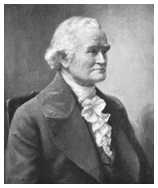

Noah Webster
Born: October 16, 1758
Place: Hartford, Connecticut
Died: May 28, 1843
Place: New Haven, Connecticut
 Noah Webster was born in Hartford, Connecticut on October 16, 1758. He spent his youth on his family's small farm, and at the age of 15 he entered Yale College in 1774. At the outbreak of the Revolution, Noah's college education was interrupted. Noah believed strongly in the American's cause and he volunteered for duty, serving under his father. As the war ended, Noah returned to the school and graduated in 1778. He had hoped to go on with his studies and practice law, but he first became a teacher.
Noah Webster was born in Hartford, Connecticut on October 16, 1758. He spent his youth on his family's small farm, and at the age of 15 he entered Yale College in 1774. At the outbreak of the Revolution, Noah's college education was interrupted. Noah believed strongly in the American's cause and he volunteered for duty, serving under his father. As the war ended, Noah returned to the school and graduated in 1778. He had hoped to go on with his studies and practice law, but he first became a teacher.
Noah Webster saw the need for better teaching and texts for teachers. The few textbooks that were available were of British origin. He believed that America should have its own standards of grammar and spelling, and not be so closely tied to the old British ways. In 1783 Webster began publication of his spelling and grammar texts. The first part of his Grammatical Institute of the English Language, A New and Accurate Standard of Pronunciation, was followed in 1784 with A Plain and Comprehensive Grammar, which was followed in 1785 by An American Selection of Lessons in Reading and Speaking. Noah Webster's texts promoted an American sense of identity, and set the standards for American's use of the English language as their own, separate from the English language of the British. The spelling, pronunciation, and grammar of the English language in this country became uniquely American as his textbooks were used in schools for nearly 100 years.
Webster's interests were not solely confined to America's use and style of the English language. He strongly advocated a national constitution, and in 1784 he began publication of his arguments as Sketches of American Policy. When the Constitutional Convention adjourned, he published several more works examining the principles of American policy, including his 1787 piece, Examination of the leading Principles of the Federal Constitution. In 1789, he began practicing law, but his real interest was writing. He established a newspaper in New York, the Minerva. Webster published multiple pamphlets and essays on issues ranging from the French Revolution to the Jay Treaty with Great Britain. He wrote works on issues spanning a wide range of topics, from a history of contagious diseases to his thoughts on insurance and banking. Webster was truly a prolific writer.
But Noah Webster's greatest achievement, and the one for which he is best known, was his American Dictionary of the English Language, first published in 1828, with a release of 2,500 copies. The dictionary had taken years to complete. Webster searched out sources for the originations of words. He traveled to Europe, learned other languages to be sure of his derivations, and tediously documented pronunciations, spellings, and usages. The original work contained some 12,000 unique words, and 40,000 definitions. The dictionary created a new standard, and set Noah Webster apart as the foremost American lexicographer. Accepted as the authority on the English language, his dictionary was revised, expanded, and updated multiple times. Noah Webster's American Dictionary of the English Language can still be purchased today from Amazon.com by clicking
here. This 1967 reprint version is a fascinating work, still widely acclaimed by researchers and historians. Even after Webster's death, his dictionary continued (and continues) to be published in various other editions. In 1843, two Massachusetts printers, George and Charles Merriam, purchased the rights that allowed them to revise the 1841 edition of Noah Webster's work, and secured the rights to create revised editions. Noah Webster died on May 28, 1843, but his legacy lives on with modern updated Merriam-Webster versions of his dictionary.
We recommend an outstanding biography on Noah Webster,
Noah Webster: The Life and Times of an American Patriot, by Harlow Giles Unger. It is well-written, and accurately portrays the numerous achievements of this amazing early American.
Looking for one of the best modern dictionaries for your desk? We recommend
Merriam Webster's Collegiate Dictionary. This dictionary is widely considered to be one of the best desktop dictionaries for today's students, readers, and writers. If it's not on your desk now, it certainly should be.
|




